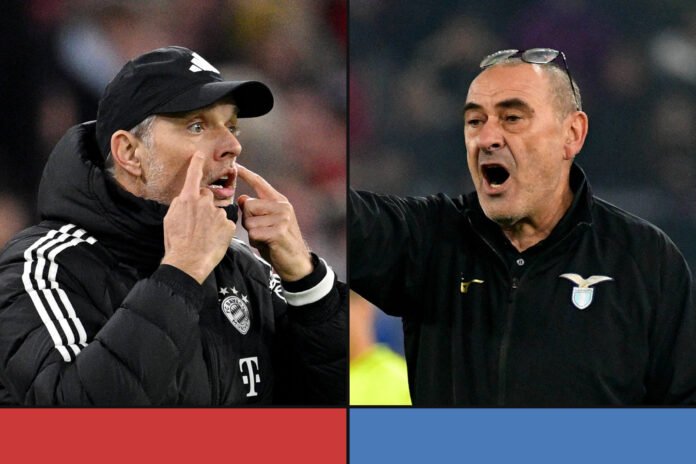When Thomas Tuchel and Maurizio Sarri meet in the Champions League on Tuesday night, they might be forgiven a moment where they discuss their shared past — and their futures.
Both men have previously managed in the Premier League — specifically at Chelsea — and both are likely to leave their current clubs at the end of the season. Tuchel has announced he will be exiting Bayern Munich in the summer, while there are growing tensions between Sarri and Lazio.
But will either of them come back to the Premier League? How have they changed since they last patrolled English touchlines? And how do they look back on their times in England?
We asked our German football expert Raphael Honigstein and Serie A guru James Horncastle to discuss Tuchel and Sarri — and what might come next for them both.
Which of the two is most likely to return to the Premier League?
James Horncastle: On the one hand, Sarri has said the Lazio job will be his last one. He’s older than Thomas Tuchel. His first job was in 1990 so he’s been coaching for a long time and there are aspects to the modern game he really doesn’t like.
On the other, his contract expires at Lazio in less than 18 months and — regardless of how much he complains about the game losing its soul, fixture congestion, VAR, the state of the pitches, how he doesn’t ever have enough time to coach — his passion for football remains strong. It’s hard to envisage him retiring at 65 or 66.
Sarri bellows instruction from the touchline (Gabriele Maltinti/Getty Images)
Raphael Honigstein: My money would be on Tuchel coming back first. He’s got a bigger market thanks to his success with Chelsea. He has also got a great command of English. And, despite idiosyncrasies, he is more presentable as a face for clubs.
How different are they from their spells at Chelsea?
Honigstein: I think the experience of Bayern has left Tuchel bruised somewhat because it’s the first time he’s been sacked for purely footballing reasons. I think we all know that his relationship with the Chelsea owners had broken down. The same was true at Dortmund. At Mainz, he left of his own volition. This time, though, Tuchelball really didn’t work. And I think that might give him pause for thought.
As far as his personal demeanour is concerned, I was surprised to see how much he seemed to care about the public criticism and how he was abreast of TV coverage. I think because of the heightened attention that Bayern had, he was more in focus than ever before and I don’t think he dealt with it as well as I would have expected.
So, I think strangely, there might be another reason why England is preferable because you don’t have one Bayern Munich, you have Liverpool, you have Manchester United, then you have smaller sides. But the attention isn’t focused on one single club the way it was in Munich.
I think Tuchel might find it easier to deal with.
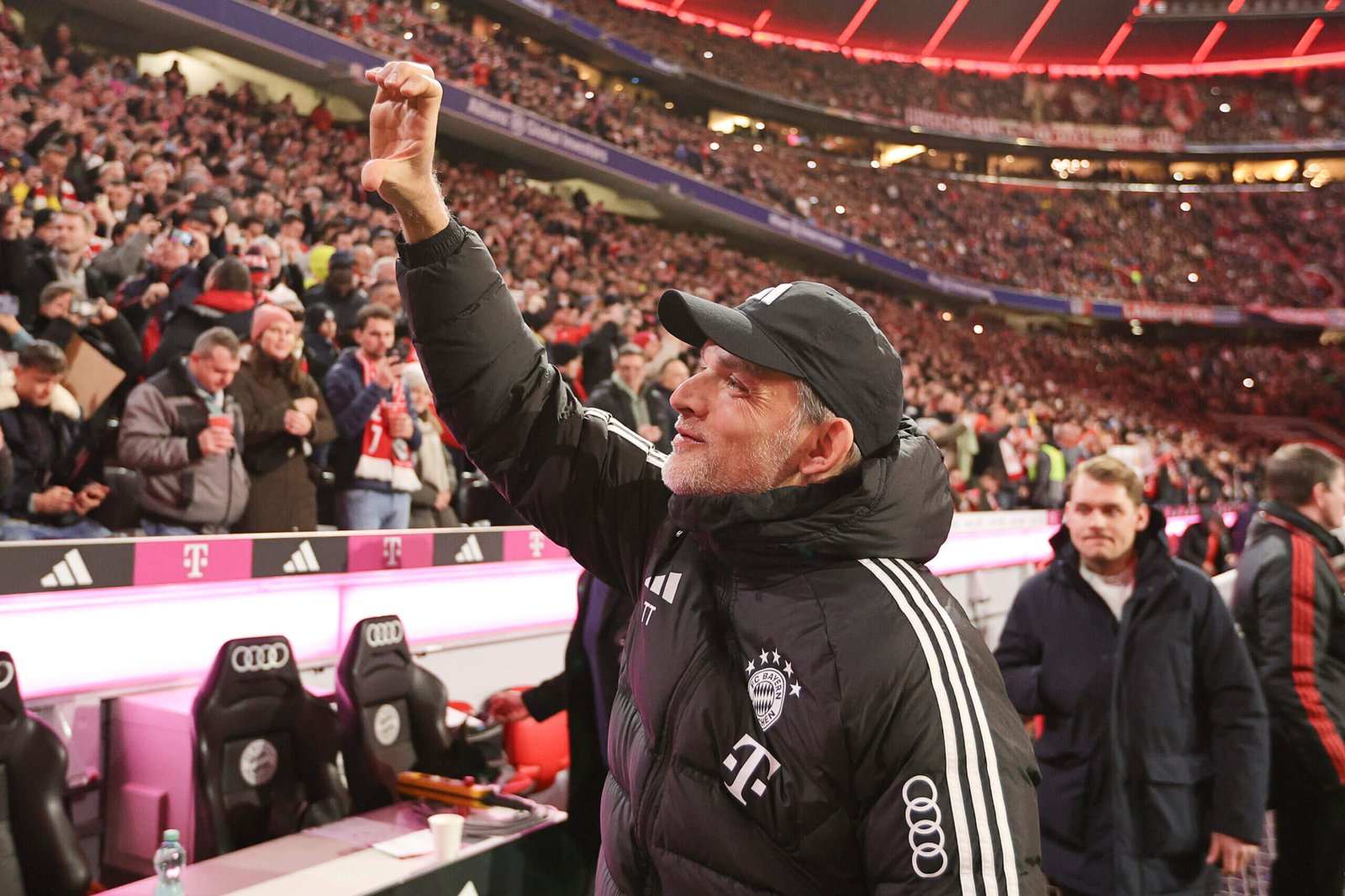
Tuchel at Bayern’s Bundesliga game against RB Leipzig last month (Max Ellerbrake – firo sportphoto/Getty Images)
Horncastle: Sarri still smokes. He’s still the deep thinker and he still gets grumpy — both still reasons why he’s still compelling to listen to. He’s still enthusiastic about the same things. He’s always been in to literature, cycling, good football. At 65, it’s hard for somebody to change. Sarri’s tactical, strategic credo remains the same.
But he’s had to adapt over the last few years.
For example, at Chelsea everyone was expecting him to make Chelsea play like his great Napoli side and, instead, they were quite boring. He ended up building the team around Eden Hazard. He did the same at Juventus. He couldn’t make the team play as a collective, so he had to bend the knee to Cristiano Ronaldo and compromise.
At Lazio, he has the most prolific goalscorer in Italy of his generation in Ciro Immobile, a striker who thrives in transition and on the counter-attack. Again, he has had to cater for that which has meant sometimes not playing a high line and a deeply possession-based game in order to create situations for Immobile to be the goal scorer that has seen him score more than 200 in Serie A.
So, as much as people think he will live and die by his philosophy, Sarri has shown himself to be able to engage in realpolitik and adapt to what players he has available.
What are their attitudes to English football and the Premier League after their experiences there?
Horncastle: Upon reflection, Sarri misses the Premier League. He admits he found Chelsea hard work at times because it was a club that was quite atypical. He claims they didn’t have a sporting director at the time; that Marina Granovskaia, the club director, ran that side of the business. He looks back at the history of Chelsea and says, ‘No coach lasted more than two years there, aside from very few exceptions.’ But he claims to have enjoyed the last few months, albeit when it was already clear he was leaving.
He felt he made a mistake in walking away. He’s said that the mistake wasn’t necessarily in walking away from Chelsea, but walking away from the Premier League. He says the Premier League has a contesto di bellezza unica; it’s a unique and special place to work because you are testing yourself against the best coaches. Sarri, quite bluntly, said that going back to Italy was a mistake.
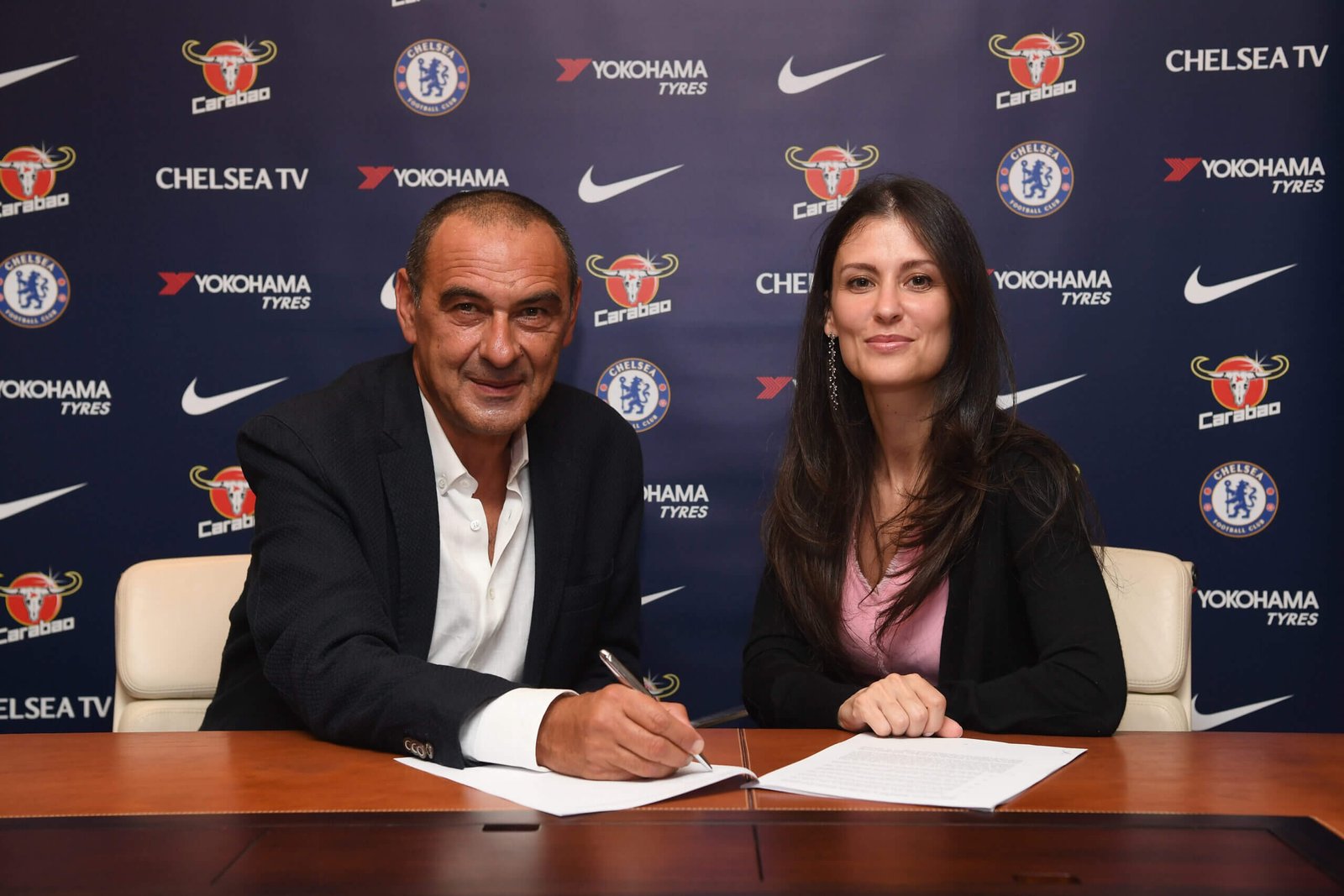
Sarri signs his Chelsea contract with Granovskaia (Darren Walsh/Chelsea FC via Getty Images)
Honigstein: I always had the sense Tuchel absolutely loved coaching in England. His relationship with Granovskaia and Petr Cech, the technical and performance advisor, was extremely tight. They let him get on with it. They kept out of his daily business to an extent that no other club had before. And he found that liberating.
He also really enjoyed the mentality of the average English player who basically does what the coach is telling them. He runs through a wall for them and doesn’t question decisions, doesn’t play politics through the media, doesn’t have people pushing on his behalf behind the coach’s back — all these things. Even though Chelsea was very volatile in different ways, he found it, liberating after the politics of Dortmund and PSG.
So I think he’d be extremely happy to come back to England.
So should Chelsea look at bringing either of them back?
Horncastle: It’s a new Chelsea. A new ownership, new executive board, new dressing room, so it would be like coming into a different club. Sarri is very good at developing players. He has a very clear tactical identity. Chelsea, for a long time in that season in the Premier League, were competitive having started with an 18-match unbeaten run in all competitions.
Yes, the football was boring. But they stayed if not in the title race then high up the table for a good while, and finished third.
Honigstein: While I don’t see any chance of Chelsea bringing Tuchel back, he wouldn’t be prepared to work under the existing ownership after their problems and the level of interference they tried to exert on him. So for me, it’s a non-starter.
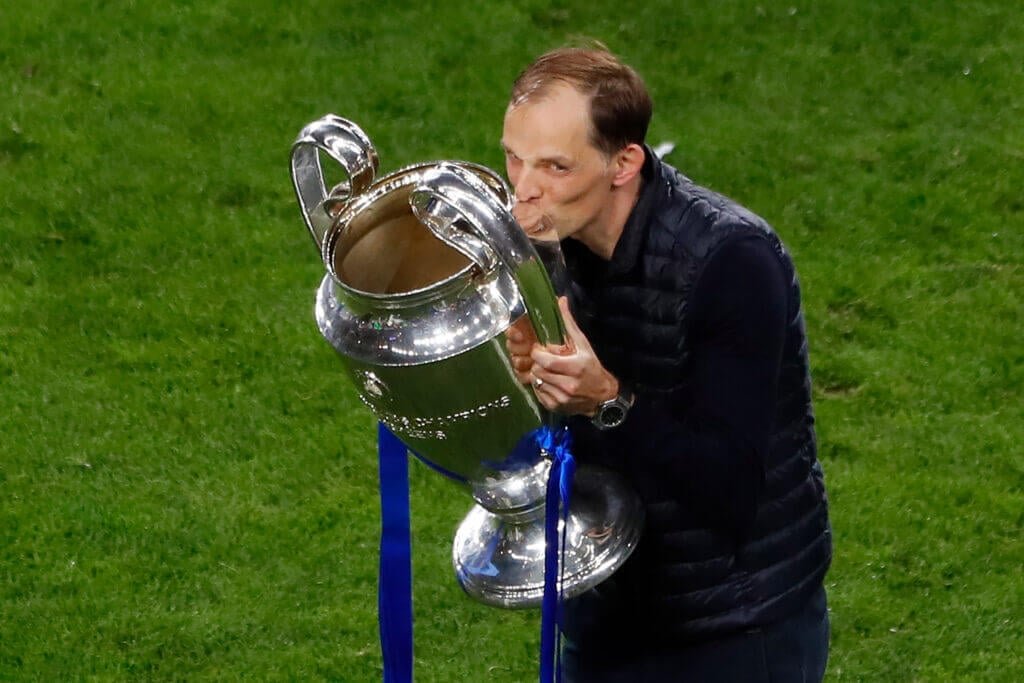
Tuchel won the Champions League with Chelsea (Susana Vera/Pool/AFP via Getty Images)
Which sort of club should each of them be looking to manage?
Horncastle: When Sarri left Napoli, again, he was forthcoming in his reasons. He wanted to take the next step and to make up for lost time by getting a big contract that would pay him what he was worth after working for decades in the lower leagues. His recent clubs — Napoli, Chelsea, Juventus, Lazio — have been big clubs, but I wouldn’t rule out him doing something like Unai Emery has done and taking over a club like Aston Villa.
There’s an acknowledgement that even mid-table Premier League teams these days have a financial wherewithal that clubs in Serie A don’t possess. But I’m not sure that would be the be-all and end-all when it comes to deciding which job to take because he has always said that he doesn’t want to be involved in recruitment decisions. There are executives there to run the transfer market and he just wants to coach.
His frustration over the last few years, going beyond his experience at Lazio, has been there is no time to coach any more in modern football. His detractors in Serie A always take those complaints as examples of Sarri not being experienced coaching teams in three competitions. They always say, ‘Well, if you only want to coach in one competition, go back to the lower leagues.’ But he has shown himself able to coach in four competitions because in 2019 he won the Europa League with Chelsea, as well as reaching the final of the Carabao Cup, the last-eight of the FA Cup and a third-place finish in the Premier League.
It would depend on the project. That’s a banal thing to say because it applies to every coach, but I don’t necessarily think he will be looking at the name exclusively.
The other thing that perhaps needs to be considered is there will be a number of jobs that come up across Europe this summer, and not just in the Premier League. Bayern, Barcelona, AC Milan perhaps. Even Napoli, and we’ve seen Aurelio De Laurentiis (owner of Napoli) go back to coaches with whom he has worked in the past. Sarri has always been an acolyte of Arrigo Sacchi and it would be interesting to see him on the bench at AC Milan because of them being kindred spirits. However, whether AC Milan see him at this stage of his career as the right solution were they to change coach at the end of the season remains to be seen.
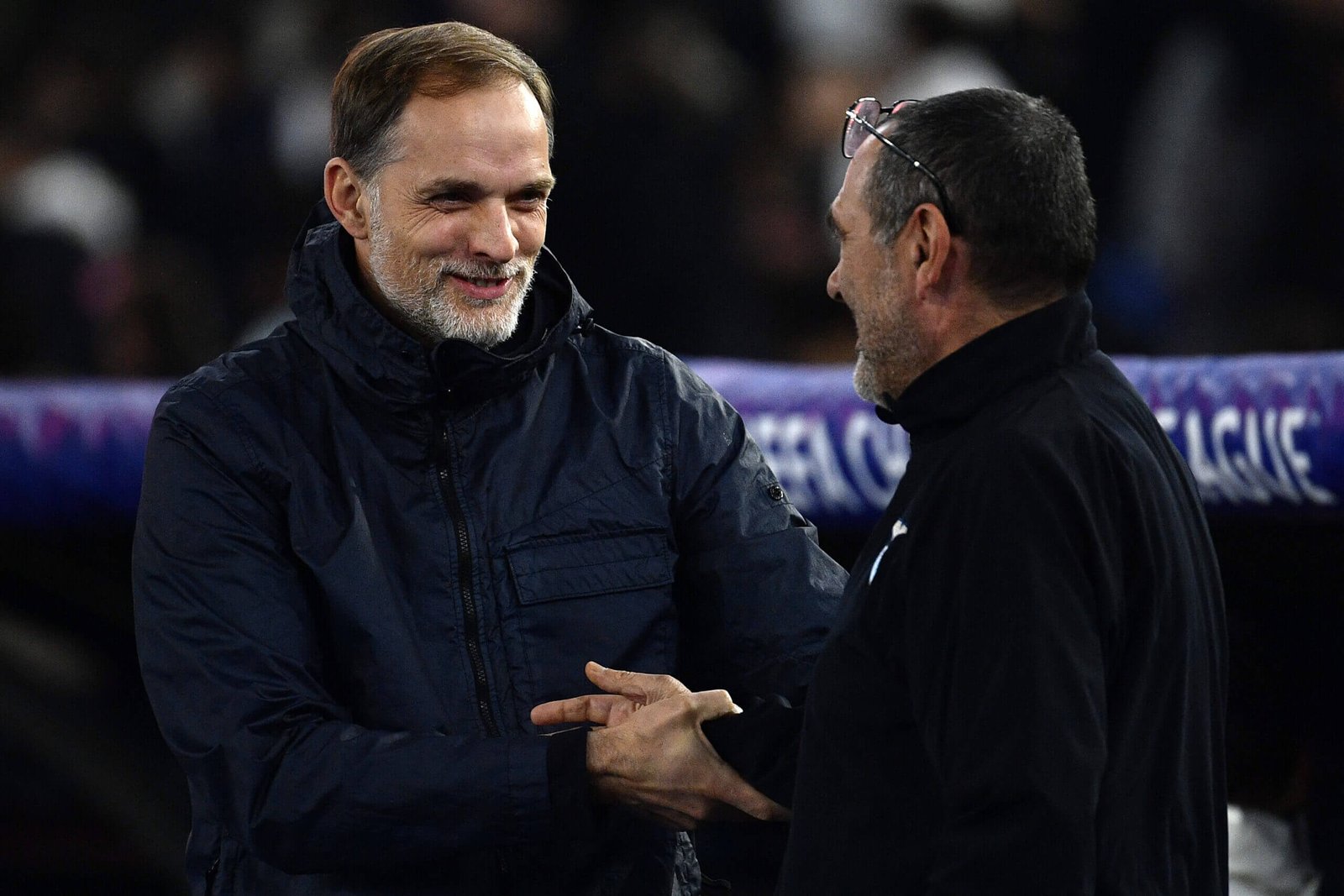
Tuchel greets Sarri prior to kick-off in Rome last month (Filippo Monteforte/AFP via Getty Images)
Honigstein: Tuchel wants to win things. He’ll be looking for a club that can compete, a club that would let him play football, a club with great players. Once you’ve reached that level, there aren’t that many places you can really go without taking a demotion or a step down. So we’re talking about a select few clubs.
I think Manchester United would be an obvious attraction for him. Liverpool — although I don’t quite see that happening — and, maybe one day, Arsenal if Mikel Arteta moves on. There is a bit of an affinity there. Those sort of clubs are what we are talking about.
Has it been a successful few years for Sarri?
Horncastle: Sarri has been more successful, relatively speaking, than at any other stage in a career largely spent toiling in the lower leagues.
Everyone remembers him looking at his Europa League winner’s medal with wonder after Chelsea beat Arsenal in Baku in 2019. He left Chelsea for Juventus and won the league, the last Scudetto of Juve’s nine in a row. They fired him after one season; Andrea Agnelli, the then Juventus chairman, called it a “s****y year” in the Amazon All or Nothing documentary. But, in hindsight, it looks better with every year Juventus fail to win the title.
Sarri says it was under-appreciated because he won regardless of the team being finished and that cycle being over.
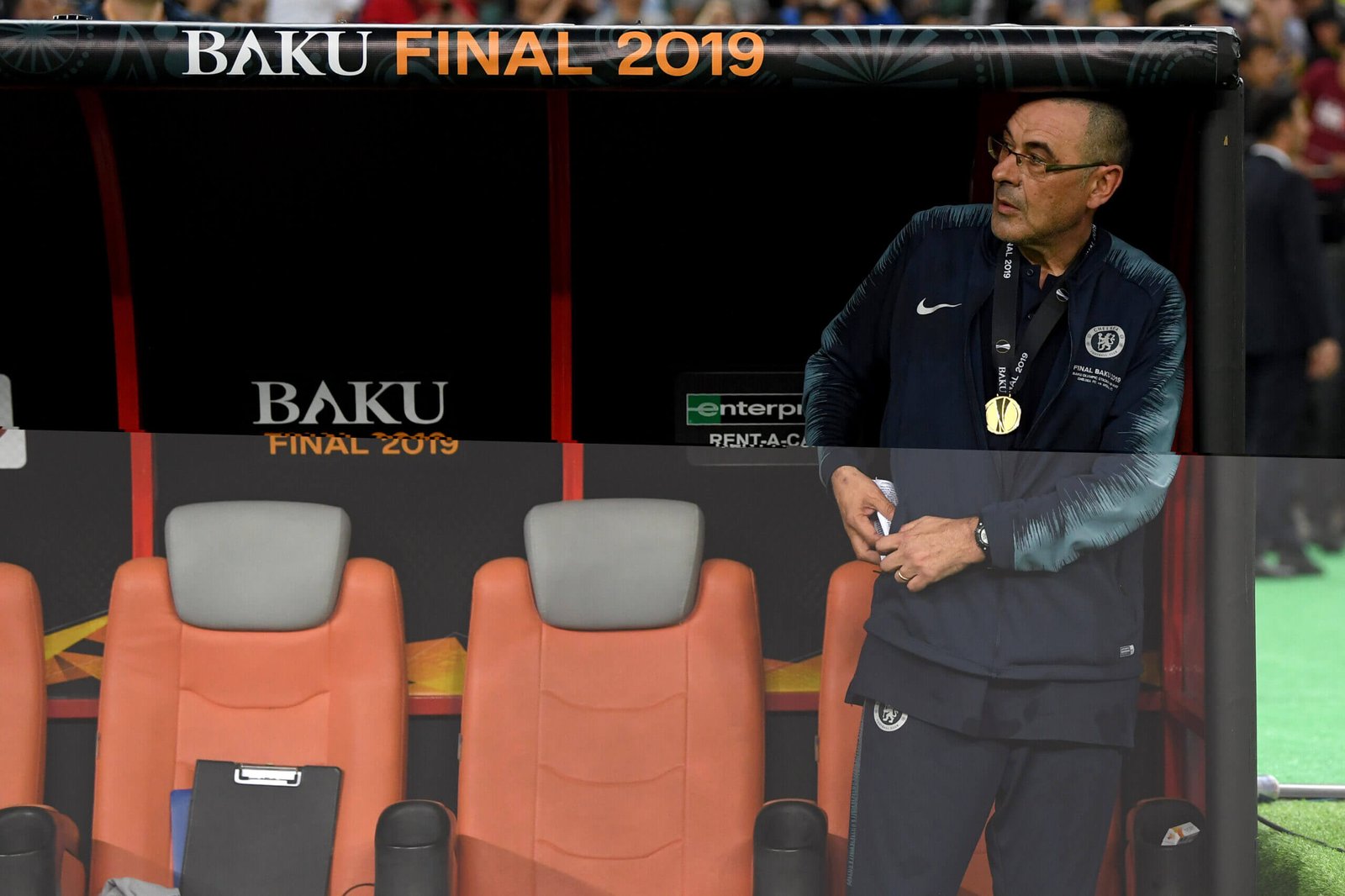
Sarri takes a moment in the dug-out after winning the Europa League with Chelsea (Shaun Botterill/Getty Images)
At Lazio he achieved their highest finish since their last league title in 2000, finishing second last year with the second highest points total in the club’s history. And the win over Tuchel’s Bayern in the first leg of the round of 16 in this season’s Champions League was Lazio’s first success in the knockout stages of the competition since 2000.
An issue for Sarri has been one of perception. Everyone judges him on how well his Napoli team played. He has never been able to replicate that. He has come close at times at Lazio, but Lazio distinguished themselves last year as a team that was extremely compact. While they could play some delightful combinations, the statistic that stood out was the number of clean sheets that Lazio kept: 21.
So he has found it difficult to walk in the shadow of what he did at Napoli. Everyone expects Sarrismo or that social media construct, Sarriball. Instead, he’s had to be quite pragmatic and adapt to some of the superstars that he’s come across since then.
Is there any chance Tuchel can do more than a few years in his next job?
Honigstein: Well, Tuchel did spend a long time at Mainz. It wasn’t always plain sailing, but it was always successful. Which is why the club and the players put up with some of his more demanding features.
Dortmund broke down over problems with the board; some players, but mostly the board. Paris Saint-Germain was a sporting director fallout. Chelsea, we know what happened. Bayern — lack of results and dressing room unhappiness.
So Tuchel would probably say in his defence that these are all different reasons. But of course, you want a more stable environment to coach in, and you want a coach that creates and builds on that stable environment. But that’s his challenge for the next job — to show he can be successful without rubbing people up the wrong way.
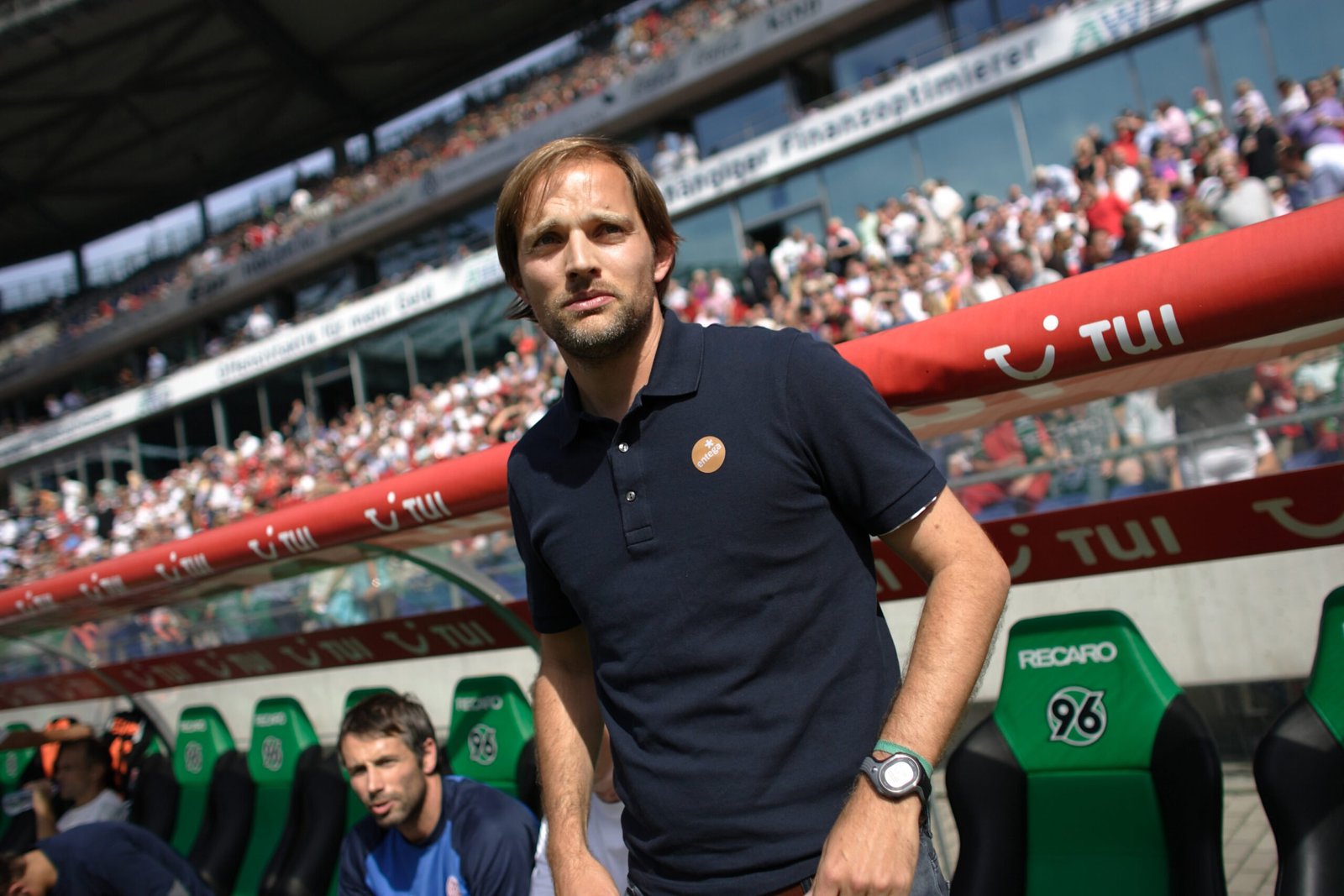
Tuchel at Mainz (Alex Domanski/Bongarts/Getty Images)
Do they remain elite-level managers?
Honigstein: Tuchel’s stock is probably not as high as it was a couple of years ago after winning the Champions League, but I don’t think the Bayern spell has done him too much damage. I still think there’s a huge market for him.
A club that I could have mentioned earlier is Manchester City. Stylistically, it would be a great fit for him even though we associate him with negative defensive football. At his heart he is a Guardiolista and would love to continue the legacy given the chance.
So no, I don’t think he is damaged. He’s still an elite manager and will have elite jobs to go into.
Horncastle: Sarri does remain ‘elite’, in my opinion. He has out-punched his opponents in Serie A over the last year. To finish second last season with Lazio’s wage bill — inferior to those of AC Milan, Champions League finalists Inter, Juventus and their city rivals Roma as well — is no mean feat. Last season they had big wins, as well, against the likes of Inter. The win against Bayern, whatever you make of how they did it and the state of Bayern at the moment… you need someone who has a strategic brain of the very highest level to achieve that.
If you look at all the hype around Roberto De Zerbi at Brighton right now, and how he has been anointed as Guardiola’s successor, it really wasn’t long ago that the same process happened with Maurizio Sarri. That changed over the course of Sarri’s year at Chelsea, but he was talked about in the same manner.
A lot of the principles behind those conversations, or that regard of Sarri, are still relevant today.
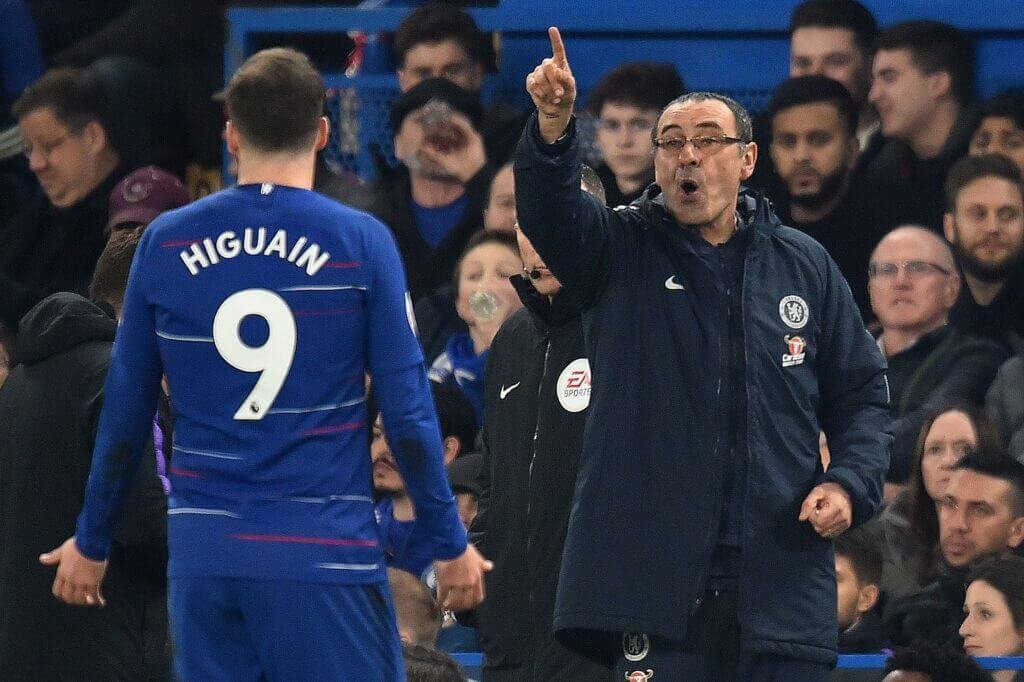
Sarri directing Gonzalo Higuain, on loan from Juventus, at Chelsea (Glyn Kirk/AFP via Getty Images)
Have either of them leaned on their time at Chelsea in approaching things at Bayern or Lazio?
Honigstein: I’m not sure the Chelsea experience had too much relevance for Tuchel at Bayern. He did dabble a little bit in a more pragmatic system and play the three at the back at Leverkusen. But Bayern’s heart wasn’t in it. Nor was the squad really suited to it, or the club prepared for it. He would probably say that was only a step towards a more holistic development rather than the ultimate idea of playing negative, pragmatic football.
Where I think it did influence his thinking was his frustrations at Chelsea about not having that proper goalscorer. That weighed heavily on his mind and we saw how desperate Bayern were to bring in Harry Kane — a bit of a reflection of what he felt was missing at Chelsea.
But, beyond that, I don’t think he would have drawn too many conclusions that were useful for the Bayern job.
Horncastle: As I’ve mentioned above, as much as Sarri is a purist and sticks to his philosophy, he’s shown himself to be very pragmatic and adaptable.
Do you have a final thought for fans of any club looking to appoint them?
Horncastle: With Sarri there is always the promise of watching some of the best football that you’ve ever seen. Again, that comes from his three years at Napoli.
That team deserved to win the league and, to borrow an old phrase from Sacchi, it did not just win. It convinced. It dazzled. Any club looking at Sarri probably chases that. That’s what appeals to them. We have this little Englander, island mentality in the Premier League which dictates what happens here is the only thing that matters. So some of the boredom that Chelsea fans experienced watching Sarri’s football has come to define him in the English mindset.
But fans of Napoli rallied around him like few other coaches. Even Luciano Spalletti was heckled at the beginning of the season last year. Napoli’s fanbase was quite moody. But with Sarri, he really entered the hearts of Neapolitans. He emerged as this kind of rebel leader. Part of the mythology around him at Napoli was about more than the football they played.
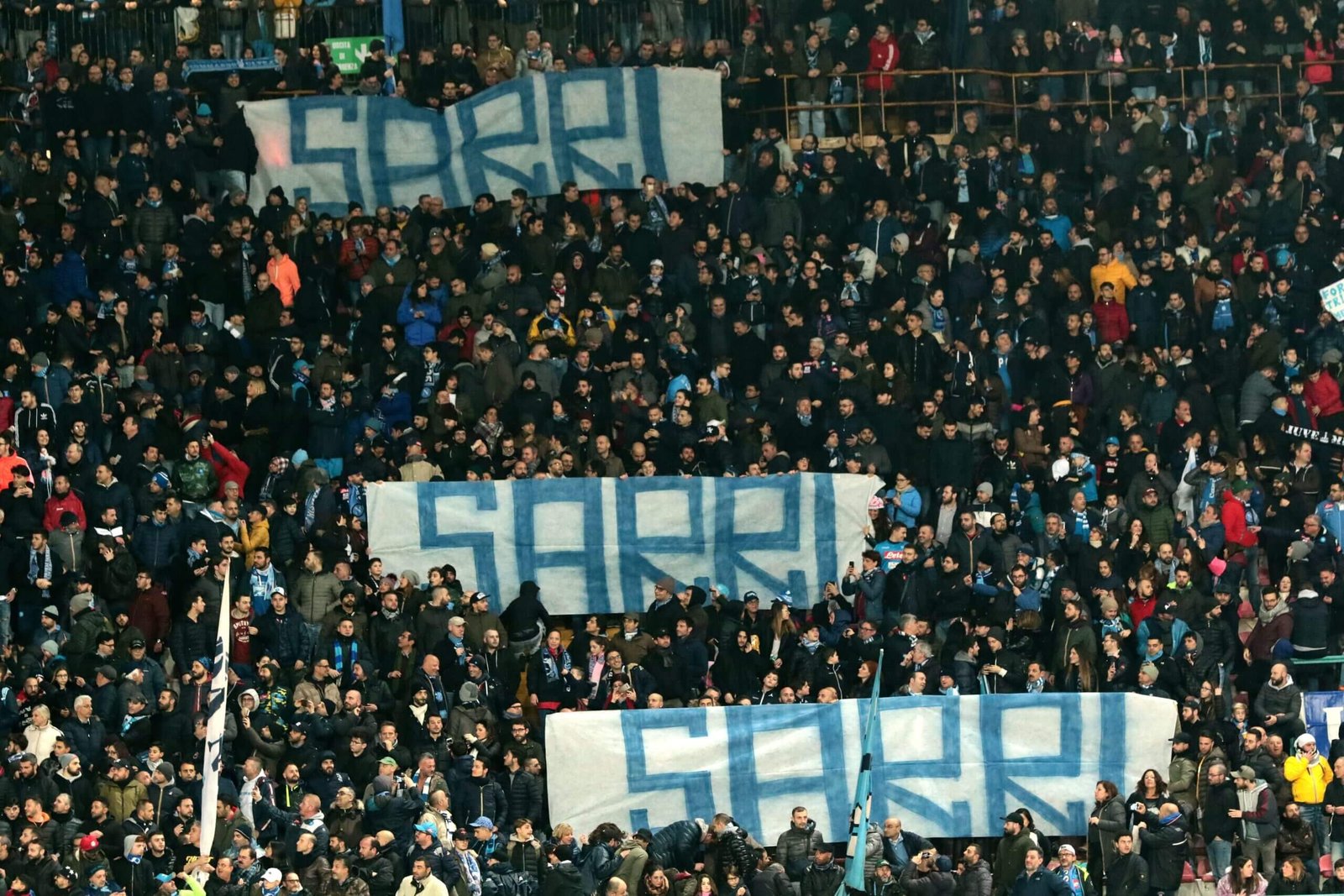
Napoli supporters make clear their support for Sarri in March 2018 (Carlo Hermann/AFP via Getty Images)
Sarri is realistic about how repeatable that is in the future. Sometimes things just click. All managers and all players would like to say there’s a lot of design in these kind of situations, but often there is accident as well. Fans should hold out hope that Sarri is still able to create a team that good, while also being aware that it might never happen again.
Honigstein: I am fundamentally convinced Tuchel remains a great manager and, in the right environment with the right players, his teams can play some fantastic football. We saw the best of that at Mainz, but then, even more so, in his first Dortmund season where they were really wonderful to watch.
The negativity or the caution that we’ve seen in recent years is perhaps more reflective of the clubs he coached rather than his real conviction as a football coach. So hopefully we’ll see that side of Tuchel’s game come to the fore again.
As a fan of a club, I’d be happy if Thomas Tuchel were to be my new coach. That would spell a) ambition and b) a high chance of silverware.
(Top photos: Getty Images)
Read the full article here


